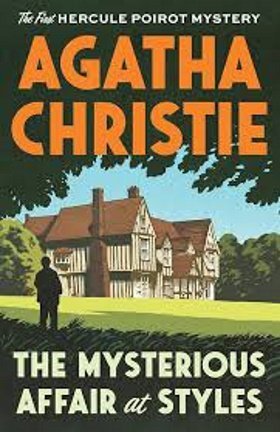“Only the doctors can tell us that, Mr. Mace.”
“Yes, exactly—of course——” The young man hesitated, and then his agitation was too much for him. He clutched Poirot by the arm, and sank his voice to a whisper: “Just tell me this, Mr. Poirot, it isn’t—it isn’t strychnine, is it?”
I hardly heard what Poirot replied. Something evidently of a non-committal nature. The young man departed, and as he closed the door Poirot’s eyes met mine.
“Yes,” he said, nodding gravely. “He will have evidence to give at the inquest.”
We went slowly upstairs again. I was opening my lips, when Poirot stopped me with a gesture of his hand.
“Not now, not now, mon ami. I have need of reflection. My mind is in some disorder—which is not well.”
For about ten minutes he sat in dead silence, perfectly still, except for several expressive motions of his eyebrows, and all the time his eyes grew steadily greener. At last he heaved a deep sigh.
“It is well. The bad moment has passed. Now all is arranged and classified. One must never permit confusion. The case is not clear yet—no. For it is of the most complicated! It puzzles me. Me, Hercule Poirot! There are two facts of significance.”
“And what are they?”
“The first is the state of the weather yesterday. That is very important.”
“But it was a glorious day!” I interrupted. “Poirot, you’re pulling my leg!”
“Not at all. The thermometer registered 80 degrees in the shade. Do not forget that, my friend. It is the key to the whole riddle!”
“And the second point?” I asked.
“The important fact that Monsieur Inglethorp wears very peculiar clothes, has a black beard, and uses glasses.”
“Poirot, I cannot believe you are serious.”
“I am absolutely serious, my friend.”
“But this is childish!”
“No, it is very momentous.”
“And supposing the Coroner’s jury returns a verdict of Wilful Murder against Alfred Inglethorp. What becomes of your theories, then?”
“They would not be shaken because twelve stupid men had happened to make a mistake! But that will not occur. For one thing, a country jury is not anxious to take responsibility upon itself, and Mr. Inglethorp stands practically in the position of local squire. Also,” he added placidly, “I should not allow it!”
“You would not allow it?”
“No.”
I looked at the extraordinary little man, divided between annoyance and amusement. He was so tremendously sure of himself. As though he read my thoughts, he nodded gently.
“Oh, yes, mon ami, I would do what I say.” He got up and laid his hand on my shoulder. His physiognomy underwent a complete change. Tears came into his eyes. “In all this, you see, I think of that poor Mrs. Inglethorp who is dead. She was not extravagantly loved—no. But she was very good to us Belgians—I owe her a debt.”
I endeavoured to interrupt, but Poirot swept on.
“Let me tell you this, Hastings. She would never forgive me if I let Alfred Inglethorp, her husband, be arrested now—when a word from me could save him!”
CHAPTER VI.
THE INQUEST
In the interval before the inquest, Poirot was unfailing in his activity. Twice he was closeted with Mr. Wells. He also took long walks into the country. I rather resented his not taking me into his confidence, the more so as I could not in the least guess what he was driving at.
It occurred to me that he might have been making inquiries at Raikes’s farm; so, finding him out when I called at Leastways Cottage on Wednesday evening, I walked over there by the fields, hoping to meet him. But there was no sign of him, and I hesitated to go right up to the farm itself. As I walked away, I met an aged rustic, who leered at me cunningly.
“You’m from the Hall, bain’t you?” he asked.
“Yes. I’m looking for a friend of mine whom I thought might have walked this way.”
“A little chap? As waves his hands when he talks? One of them Belgies from the village?”
“Yes,” I said eagerly. “He has been here, then?”
“Oh, ay, he’s been here, right enough. More’n once too. Friend of yours, is he? Ah, you gentlemen from the Hall—you’m a pretty lot!” And he leered more jocosely than ever.
“Why, do the gentlemen from the Hall come here often?” I asked, as carelessly as I could.
He winked at me knowingly.
“One does, mister. Naming no names, mind. And a very liberal gentleman too! Oh, thank you, sir, I’m sure.”
I walked on sharply. Evelyn Howard had been right then, and I experienced a sharp twinge of disgust, as I thought of Alfred Inglethorp’s liberality with another woman’s money. Had that piquant gipsy face been at the bottom of the crime, or was it the baser mainspring of money? Probably a judicious mixture of both.
On one point, Poirot seemed to have a curious obsession. He once or twice observed to me that he thought Dorcas must have made an error in fixing the time of the quarrel. He suggested to her repeatedly that it was four-thirty, and not four o’clock when she had heard the voices.

























